Sitting with 15 strangers around a 20-foot dining table adorned with monogrammed plates and stemmed wine glasses, I realize that I may have found Sicily’s best-kept secret. Behind me, blue shutters open onto a 19th-century farmhouse courtyard, where wild jasmine climbs limestone walls and a small dog lays under an umbrella, hiding from the hot sun. Fabrizia Lanza, the owner and director, smiles at me. “You must stay one more night!” she pleads warmly. “You have to meet the sheep farmer who supplies our cheese: He’s the George Clooney of Sicily.”
Three days earlier, I honk my rental car up the narrow winding roads. This isn’t a typical Sicilian vacation, but a journey into farmland and ancient history. After a final ascent, I arrive at the grand estate, where I’m greeted by the signature blue door archway and stone walls adorned with pink roses. Ana Fernandez, the hospitality manager, warmly welcomes me to Case Vecchie, home of the Anna Tasca Lanza Cooking School.
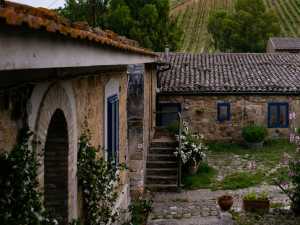
Case Vecchie, home of the Anna Tasca Lanza Cooking School, is located in the rural heart of Sicily and offers guests a chance to make rustic Italian cuisine
Deirdre Buryk
In traditional Baglio style, my room is located through the limestone-paved courtyard, the social centre of a typical Sicilian farm estate. Charming and rustic, the room is outfitted with 19th-century furniture, floral bedsheets and those same blue-shuttered windows that open out to a dreamy garden of wildflowers exploding with life.
I first heard whispers of this hidden oasis during a cooking and photography course in Florence, where a chef spoke of its vineyards and centuries-old recipes. Months ago, I took the plunge, booking myself on a four-night signature stay at Anna Tasca Lanza Cooking School (priced at around $3,900 and offered from April to June and September to October.)
A traditional Sicilian dish of zucchini flowers stuffed with ricotta
Deirdre Buryk
Now, seated among grapevines, I find myself sharing meals with a colourful mix of fellow travellers — a retired Broadway couple, a Canadian naval officer, a mother-daughter duo and a Houston transplant trading her old life for this Sicilian dream. As we pass dishes across the table, it becomes clear that this is more than a cooking school: It’s a gateway to Sicily’s soul. Here, tradition, community and the land come together in every bite.
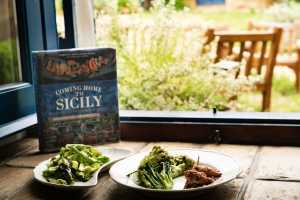
Guests learn to make traditional Sicilian meals at Anna Tasca Lanza Cooking School
Deirdre Buryk
Sicily, once overlooked for its agricultural potential, is home to one of the island’s enduring treasures: Baglio Regaleali, the onsite winery, where the Tasca d’Almerita family has been farming for over two centuries. Their historic estate, nestled in the Sicilian hills, produces wines that have earned them a place among Wine & Spirits magazine’s Top 100 Wineries in the World. At the heart of this recognition are three classic wine styles: crisp, fresh whites; balanced, medium-bodied reds; and a rosé with an understated elegance.
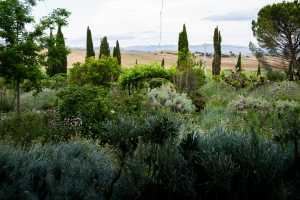
Case Vecchie, home of the Anna Tasca Lanza Cooking School, is surrounded by a lush landscape of gardens and fields
Deirdre Buryk
What sets Baglio Regaleali apart isn’t just its vintages, but its commitment to sustainable farming, eschewing chemical agents and focusing on preserving the land for future generations. The estate’s flagship wine — Riserva Del Conte, a velvety blend of perricone and nero d’avola, aged in chestnut barrels — encapsulates the vibrant energy of Sicily’s rich terroir. These bottles, steeped in tradition and crafted with care, can be found in the LCBO’s vintages section.
After touring the cellar and the tasting room, we stroll home with wine-stained lips, passing through olive gardens and enjoying a peaceful evening as the sun lowers in the sky. The sound of clinking drifts from the kitchen and birdsong fills the night air as we gather for appetizers in the courtyard.
Francesca Farris, the hospitality director, serves glasses of crisp estate wine while Lucia, the gardener, arranges peacock-painted plates with tender artichoke hearts and pickled mushrooms bursting with tangy flavour.
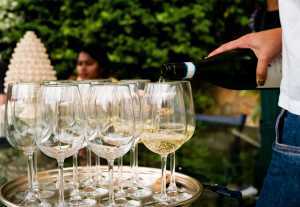
Guests at Anna Tasca Lanza Cooking School sip glasses from the on-site winery
Deirdre Buryk
A selection of local rich cheese and baskets of warm homemade bread with a golden crackling crust are laid out before us. I spread the creamy ricotta over a slice of fresh bread, top it with a medley of mushrooms and take a bite. I immediately melt into my seat. I could get used to this Sicilian lifestyle — and I’ll be taking a piece of it home with me in the form of my new cooking skills.
The following day, I meet chef Kyle Pierce and cooks Enza and Fabianna in the kitchen. An extension of the dining area, it’s fitted with two stainless steel countertops, mirrors on the ceiling, an oven and two stove sets. It’s intimate enough for bonding and well-equipped for learning. The pantry is stocked with essentials like capers; currants; super-fine OO flour; and estratto, an intensely sweet, umami tomato paste.
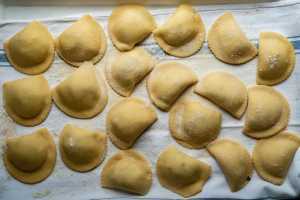
Guests at Anna Tasca Lanza Cooking School make pasta from scratch
Deirdre Buryk
“We take our coffee seriously,” Enza says to me as I eye the multiple beautiful coffee urns, ranging in size. This is the heart of Sicilian food knowledge and culture, celebrated and shared through the magic of cooking lessons.
I sit with Lanza in her office, a magnificent living room filled with books and art. She shares stories about her late mother Anna Tasca Lanza, who founded the school. A strong woman who wanted to do something different with her life, she says Tasca opened up the school at a time when few in Italy were as passionate about food traditions as they are now.
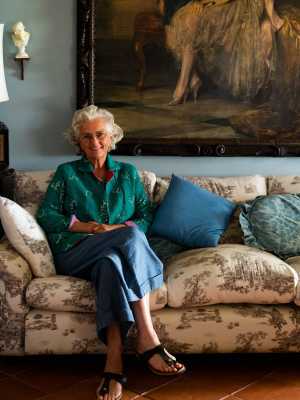
Fabrizia Lanza, the owner and director, took over the school after her mother passed away
Deirdre Buryk
“For me, tradition is the now, and whatever you do to it. It is alive. Nobody would take a recipe from 50 years ago and do it the same today. It is different water, different flour and a different smell in my hands. You are putting yourself in the same intention, warmth and desire that someone 50 years ago had and did. You have a memory you are trying to follow. The way I cook is not how my mom cooked. True, the name of the dish is the same but it evolves. That is the beauty of food,” says Lanza.
After many years as an art curator, Lanza returned home to help her mother. Gradually, she became captivated by Sicilian cuisine and expanded her mother’s mission into a hub of Sicilian food knowledge. “Food is not just food or a recipe. It is an organic way of living. Food is just one tool to understand a place. We have a connection to the land, the people here see this connection and I have a connection with the people who work with me. Everything is connected. This is an organism.” I think about how good food needs good agriculture. Here, agriculture is the priority, and as a result, we are in food heaven.
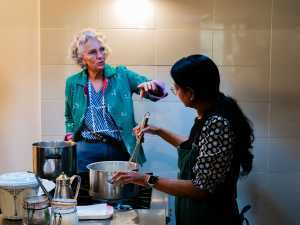
Fabrizia Lanza, the owner and director, takes over a cooking class
Deirdre Buryk
We walk across the courtyard to the kitchen where she interrupts the beginning of the lesson to take over. Her presence in the kitchen is unmistakable. As we gather around the kitchen counters, ready to cook, Lanza begins, “When I see you behind the table moving your hands, I can get more from you than us just talking.”
With that, a mountain of flour with orange yolks nested in the centre is ready to be mixed and prepped for our fresh pasta dough. We roll it into thin sheets, filled with fresh ricotta from a local farmer, and shape them into ravioli, which is seasoned in a pan with sage and brown butter. We work tirelessly, cleaning fresh squid to stuff with a sweet meat filling, and making a lemon custard to pair with fresh fruits from the property, enjoying every moment with laughter and chatter.
Cleaning squid is part of the cooking class at Anna Tasca Lanza Cooking School
Deirdre Buryk
The dinner table inside is heavy with Sicilian dishes like saffron potatoes, wild fennel green fritters, olive oil-soaked broccolini, stuffed squid, sage butter ravioli and almond cake. But first, outside in the aperitivo garden, we’re preoccupied with devouring zucchini flowers stuffed with sardines and ricotta, a traditional Sicilian dish. Each plate tells a story, enriched by century-old rural wisdom.
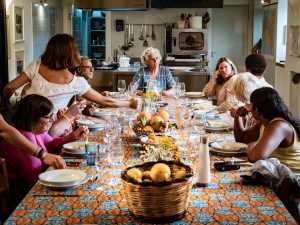
Guests at the school gather around a communal table to eat
Deirdre Buryk
Leaving my new Italian family, I brave the country roads in the little Peugeot. I say goodbye to the historic vineyards, olive groves, pastures and unspoiled beauty of the vegetable gardens. I was drawn to Anna Tasca Lanza’s Cooking School because of the focus on good food, but the magic extends to the place and the people who were also pulled there.
Everyone on the estate welcomed us like family, as though this was the first group of guests to step foot on their 200-year-old estate. In reality, I was one of nine that week, in a long line of guests to visit over the last 35 years. Rather than feeling insignificant, I feel full — both with gratitude for this adventure and from all the beautiful food and wine I’ve had the pleasure of experiencing.
